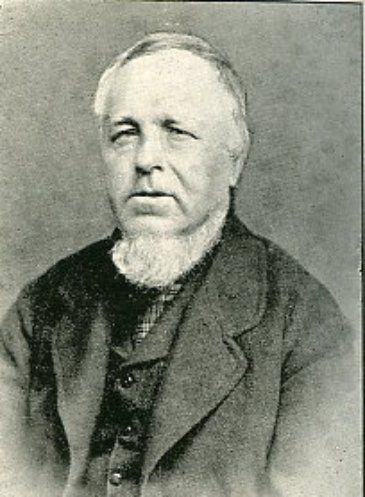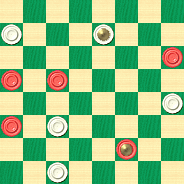The Checker Maven
Jump to navigationMore Wyllieness

A couple of Checker School installments back, we presented a position attributed to the great champion James Wyllie, "the Herd Laddie." Unsurprisingly, many other positions and studies are ascribed to this great master of days gone by.
Today's entry differs greatly from the previous presentation. Whereas that solution tended toward the subtle, this one leans more to the spectacular. Mr. Wyllie, obviously, was expert in every facet of the game, from the most delicate wins to the most bombastic strokes.
We've given you enough of a hint already, and you'll probably find this problem to be somewhat on the easier side.
BLACK

WHITE
White to Play and Win
W:W30,22,20,K7,5:BK27,21,14,13,12.
Show your wiles and be Wyllie by finding the solution and then clicking on Read More to see the solution, sample games, and explanatory notes.![]()
Solution
As is our usual practice, the solution, sample games, and lettered notes are taken from Ben Boland's Famous Positions in the Game of Checkers. Numbered notes are by the Editor, using Ed Gilbert's KingsRow computer engine and 10-piece endgame database.
7-10, 14-17, 30-25, 21-30---1, 10-15, 17-26, 20-16, 12-19, 15-22. White Wins.
Game: 11-15, 21-17, 9-13, 25-21, 8-11 17-14---2, 10-17, 21-14, 6-10, 22-17, 13-22, 26-17, 4-8---3, 29-25, 2-6, 24-19, 15-24, 28-19, 11-15, 27-24, 15-18, 31-26, 18-27, 32-23, 6-9, 23-18, 8-11, 24-20, 9-13, 25-22, 5-9, 14-5, 10-15, 19-10, 7-21, 18-14, 11-15, 14-10, 15-19, 22-18, 19-24, 26-22, 24-27, 18-14, 27-31, 14-9, 31-27, 9-6, 3-7, 10-3, 1-10, 3-7, 10-14---A. Forms above position. J. Wyllie vs. An Amateur. Game 67, Page 200, Gould’s Match Book.
The following game has a similar ending.
Game: 12-16, 24-20, 8-12, 28-24, 9-14, 22-18, 3-8, 18-9, 5-14, 23-19, 16-23, 27-9, 6-13, 26-23, 10-15, 31-27, 1-6, 23-19, 15-18---D, 25-22, 18-25, 29-22, 6-9, 27-23. 7-10, 32-28, 11-15---B, 23-18, 2-6, 18-11, 8-15, 20-16, 9-14, 21-17, 14-21, 16-11, 6-9---C, 11-7, 4-8, 7-3, 8-11, 3-8*, 9-14, 24-20, 15-24, 8-6, 24-27, now 6-10, 14-17, 30-25, 21-30, 10-15, 17-26, 20-16, 12-19, 15-22. White Wins. W. Buttery, Draughts Review, Vol. 4, 1928.
A---Loses. 10-15 draws. F. Tescheleit, in Master Play.
B---A very weak move. 10-14 is much stronger.
C---The losing move. 12-16, 19-12, 15-19, etc., draws with care, J. Alexander.
D---6-10, 25-22, 2-6, 27-23, 15-18, 23-14, 10-26, 30-23, 7-10, 29-25, 11-16, 20-11, 8-15, 25-22, 4-8, 22-17, 13-22, 23-18, 8-11, 18-14. White Wins. N. W. Banks. vs. H. Lieberman, 3rd American Tourney Book. Also see “Familiar Themes," Page 9.
1---The order of the jumps doesn't matter.
2---Gives Black a small but recognizable edge. 24-19 or 30-25 are better.
3---More or less brings the game back to an even state, whereas 15-18 would have kept Black's small edge.
Wm. McClymont in the Manchester Weekly Times, Nov. 8, 1895, has a similar setting as No. 539. Black on 12, 13, 14, 21, 27 and White on 22, 30, Kings on 7, 11. White to play and draw. Also D. Hamilton, No. 110, May 1925. Draughts Review, Vol. 1. A similar setting is No. 5 by B. Case, in the New Checkergram, March 1933.
Another game leading to the above theme may be found as Game No. 175, Page 68, in the Ninth National Tourney Book. The game was played between A. Heisman and H. O. Newcomb. The win was missed, pointed out by A. Herman, Mt. Sterling (Ky) Advocate, August 6, 1940.
You can email the Webmaster with comments on this article.
